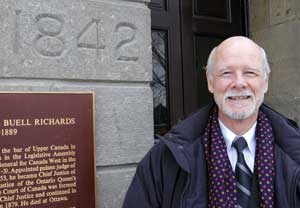Embattled Justice Paul Cosgrove will likely seek leave to appeal to the Supreme Court of Canada after the Federal Court of Appeal ruled that provincial attorneys general can force inquiries into judicial conduct.

A judicial inquiry committee into the Ontario Superior Court judge’s conduct skidded to a halt in 2005 after Cosgrove challenged the constitutionality of s. 63(1) of the Judges Act, which allows a provincial attorney general to request an inquiry into the conduct of the judge without the complaint being screened by the Canadian Judicial Council, has been before the courts.
The Federal Court ruled in Cosgrove’s favour in the matter in 2005, saying it was unconstitutional for attorneys general to request investigations without going through the ordinary CJC screening procedures. However, last week’s Federal Court of Appeal decision found in favour of the Attorney General of Canada, ruling that s. 63(1) of the Judges Act is constitutional, setting aside the lower court’s decision.
“The public interest in an appropriate procedure for the review of the conduct of judges is an aspect of the public interest in the administration of justice.
Therefore, it seems to me to be consistent with Canadian constitutional principles for provincial attorneys general to play a part in the review of the conduct of judges of the superior courts of their respective provinces,” wrote Justice Karen Sharlow on behalf of the panel including Justices John Evans and J. Edgar Sexton.
Cosgrove was originally called before a judicial inquiry three years ago after Ontario Attorney General Michael Bryant sent a letter to the Canadian Judicial Council in April 2004 requesting an inquiry into the judge’s conduct following his 1999 decision to stay Julia Elliott’s murder charges.
In that case, R. v. Elliott, Cosgrove concluded that there had been at least 150 violations of the Charter in the prosecution, and pointing the finger at Crown counsel, police, and senior members of the Ministry of the Attorney General of Ontario.
The Ontario Court of Appeal overturned the decision in 2003, ordering a new trial and noting that “the trial judge made numerous legal errors as to the application of the Charter,” and “he made findings of misconduct againstCrown counsel and police officers that were unwarranted and unsubstantiated.”
Bryant’s lawyers successfully argued in the appeal that the attorney general was acting as “a guardian of the public interest” in being able to force inquiries.
According to last week’s Federal Court of Appeal decision, Bryant had “expressed the opinion that the conduct of Justice Cosgrove throughout the trial had so undermined public confidence in the administration of justice in Ontario that Justice Cosgrove had become incapable of the due execution of his office.”
Chris Paliare, Cosgrove’s counsel, told Law Times that he has not yet discussed the options with his client, but says his recommendation is to seek leave to appeal to the Supreme Court of Canada.
“The very fundamental issue of judicial independence is at stake and it ought to be pursued at the Supreme Court of Canada,” he says.
Although the CJC’s typical complaints procedure requires that a complaint be screened first by members of the judicial council, according to s. 63(1) of the Judges Act, if the minister of justice or one of the provincial attorneys general request the CJC launch an inquiry into the conduct of a judge, the complaint does not go through the usual screening procedure.
Following the Ontario attorney general’s request in 2004, a five-person inquiry committee was appointed, but Cosgrove soon brought an application to challenge the constitutionality of s. 63(1), which the committee dismissed. The inquiry into the judge’s conduct has been on hold since Cosgrove took the matter to the Federal Court, requesting a judicial review of the committees’ decision.
Federal Court Justice Anne L. Mactavish set the committee’s decision aside, ruling it had no jurisdiction to proceed with the inquiry and that s. 63(1) was unconstitutional.
By allowing the appeal, the Federal Court of Appeal has referred the matter back to the inquiry committee. According to the Canadian Judicial Council, unless there is an appeal to the Supreme Court of Canada, the inquiry committee is expected to resume its deliberations regarding Cosgrove in the near future.
Paliare says that many are commenting about theoretical threats to judicial appointments by the changes to the appointment process and says, “Here’s an example of a real threat to judicial independence and those two things, I don’t think, can co-exist.”
Counsel for the attorney general of Canada could not be contacted by press time. Counsel for intervener, the attorney general of Ontario, declined to comment on the case, saying that the matter is still before the courts. Counsel for the Canadian Superior Court Judges Association, who acted as intervener, also declined to comment.

 A judicial inquiry committee into the Ontario Superior Court judge’s conduct skidded to a halt in 2005 after Cosgrove challenged the constitutionality of s. 63(1) of the Judges Act, which allows a provincial attorney general to request an inquiry into the conduct of the judge without the complaint being screened by the Canadian Judicial Council, has been before the courts.
A judicial inquiry committee into the Ontario Superior Court judge’s conduct skidded to a halt in 2005 after Cosgrove challenged the constitutionality of s. 63(1) of the Judges Act, which allows a provincial attorney general to request an inquiry into the conduct of the judge without the complaint being screened by the Canadian Judicial Council, has been before the courts.